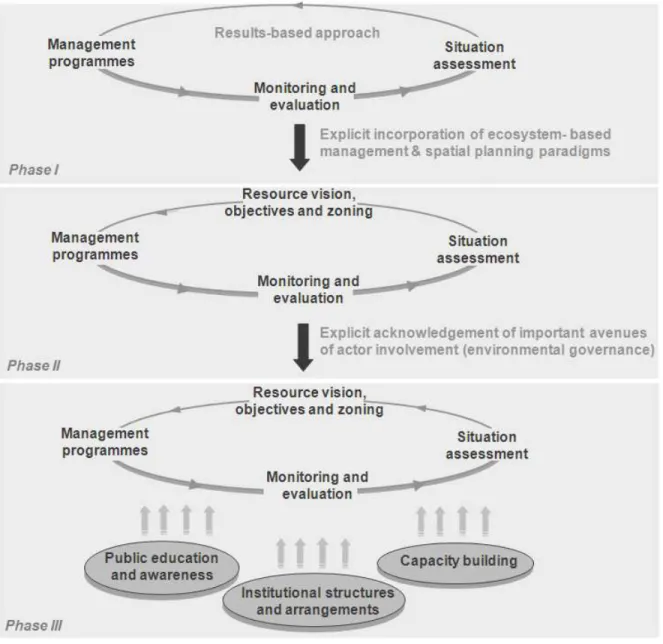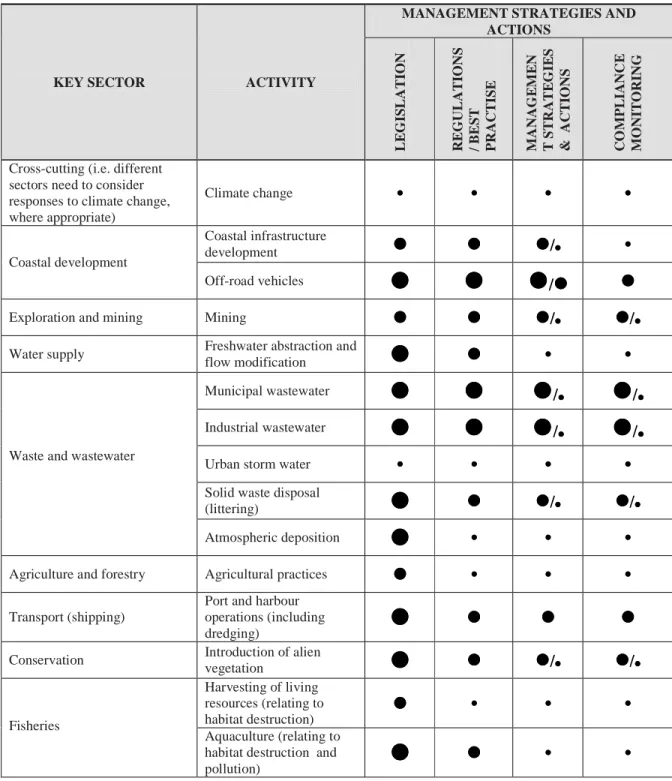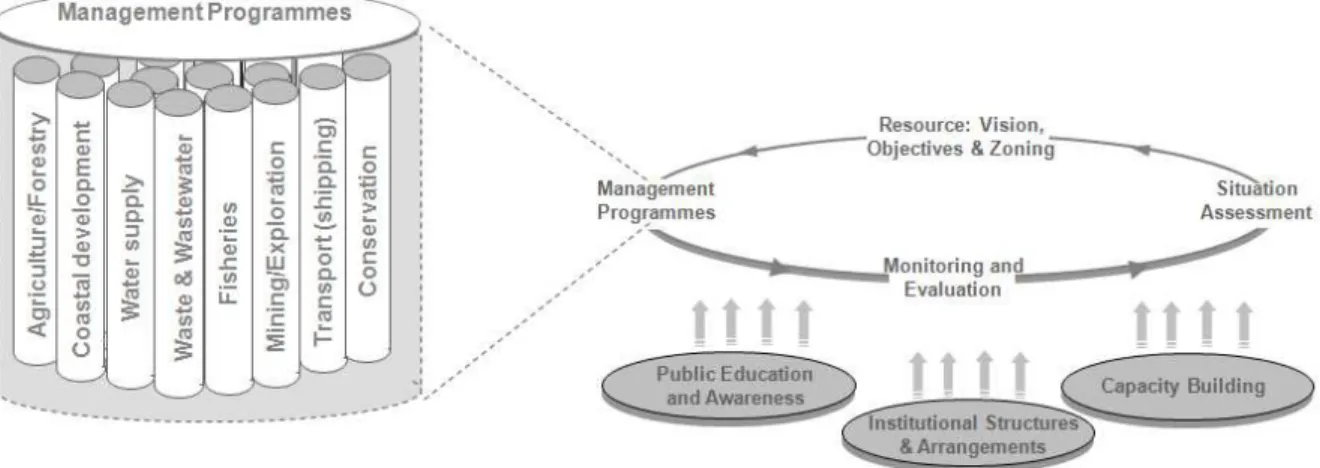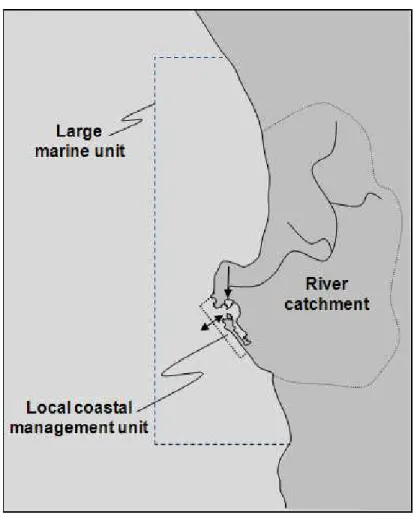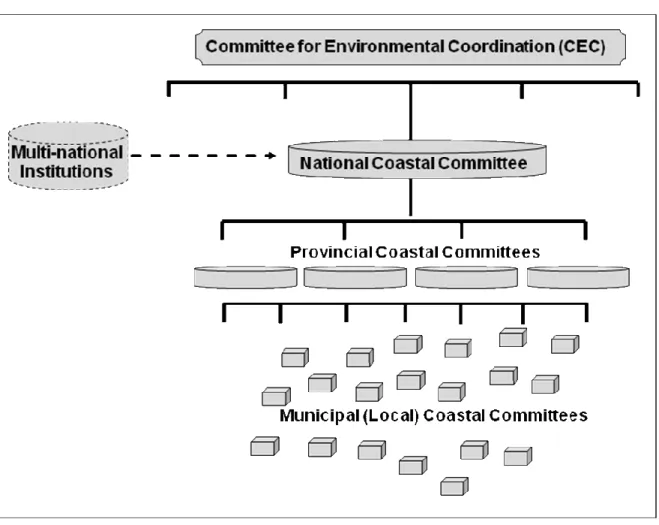The Coastal Policy gained legal status in 2008 with the promulgation of the National Environmental Management: Integrated Coastal Management Act (ICMA) (RSA, 2009). The success of management institutions relies on sound and easily accessible scientific information to empower stakeholders to participate in the decision-making process. The following sub-sections discuss each of the components and supporting elements of the prototype ICM implementation model in turn.
A central element in the ecosystem-based management approach is the delineation of the appropriate ecosystem management unit (i.e. establishing the geographic management boundaries) (Halpern et al., 2008). Demarcating the geographical boundaries of the local (smaller) coastal management units is more difficult. Furthermore, both the pressures (or direct causes) and the underlying (or indirect) causes of the problems in the marine coastal environment must be considered to determine whether the vision and resource targets can realistically be achieved.
The established knowledge of the authors was taken into the formulation of the process of determining management strategies and actions within the prototype model. Each of the four sources provides the information needed for the proposed integrated and structured approach to determining management strategies and actions within management programs. Similarly, the resource component of compliance monitoring could potentially overlap with the comprehensive monitoring and evaluation component of the framework.
Following Billé (2007), the monitoring and evaluation component of the prototype model allows for evaluation of the actual implementation of ICM against jointly set goals.
Empirical Validation: A South African Case Study
This implies that management programmes, although largely sector-based, are embedded in an ecosystem-based approach subordinated to the agreed demands and needs of the coastal ecosystem. The most recent overviews of the international and national legislation relating to South Africa's coastal and marine systems are provided by Glavovic and Cullinan (2009) and McLean and Glazewski (2009) respectively. Taljaard (2011) demonstrated the complexity and especially the sectoral nature of the legal framework, an overview of the national legal acts related to the management of the coastal marine environment.
Apart from overarching, enabling legislation, such as the Constitution of the Republic of South Africa Act (RSA, 1996) and the National Environmental Management Act (NEMA) (RSA, 1998a), legislation is largely sectoral, i.e. despite the legislation and best practice, the concept of spatial planning or zoning within the marine coastal environment (i.e. areas seaward of the high water mark) is not fully embedded in the country's national spatial development processes (e.g. the practice of integrating spatial planning and zoning of the marine coastal environment in the existing spatial planning processes, especially at the local level, is not yet common practice in South Africa.
This aims to ensure that management programs are based on an ecosystem-based approach and remain dependent on the demands and needs of the coastal ecosystem (Figure 3). Each of the land-based activities is categorized as important to a specific sector, except for climate change which is cross-sectoral. After identifying key sectors and activities for management, the extent to which management strategies and actions are defined must be determined.
The results of the investigation of management strategies and measures (Table 2) show that legislation is needed to authorize the. Programs specifically related to the coast include the State of the Coast and State of Estuaries programs (DEA, 2011). Capacity building and skills development are major concerns in South Africa, even as they affect the competent management of the coastal marine environment.
However, dedicated long-term development programs specifically aimed at improved management of the coastal marine environment do not exist and are needed. The importance of public participation and awareness as a supporting element in the management of the coastal marine environment has long been recognized in South Africa, and this is reflected in the establishment. Coastwatch was established in the province of KwaZulu-Natal under the auspices of the Wildlife and Environment Society of South Africa (WESSA, 2011a).
More importantly, however, the practice of incorporating spatial planning and zoning of the coastal marine environment into existing physical planning processes, particularly at the local level, is not yet common in South Africa. In the monitoring and evaluation component of the management cycle, it is the coordination and adaptation that falls short.
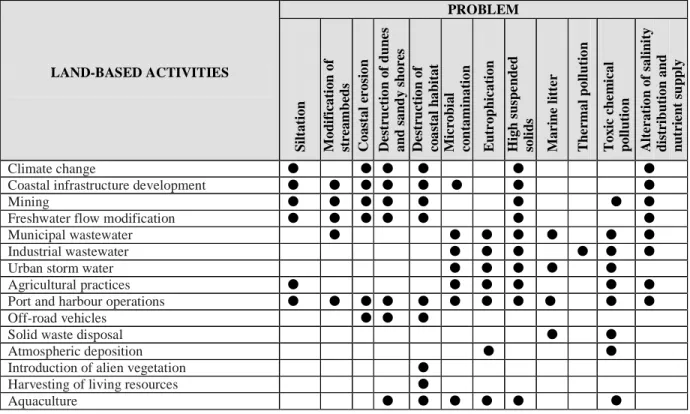
Conclusion
Further, based on the generic nature of the prototype model and the degree of compatibility found in the empirical test, the ICM implementation model presented in this study is proposed as a potentially suitable model for countries with coastal management environments similar to Africa. of the South, i.e. extensive existing legislation and numerous initiatives supporting already existing ICM, but governed under a predominantly sector-based system. Clearly, further empirical testing of the prototype model is required to determine the extent to which this claim is valid. Moreover, although the exposition in this paper lends confidence to the usability of the prototype model in a sector-based governance system, testing the prototype model against theoretically derived criteria forms a necessary next step in establishing it scientifically.
South Africa's National Action Program for the Protection of the Marine Environment from Land-Based Activities. State of the Environment Reports [Online] Available www.environment.gov.za/soer/index.html (accessed. Recommendation of the European Parliament and of the Council of 30 May 2002 on the implementation of integrated coastal zone management in Europe.
An indicator set to measure progress in the implementation of integrated coastal zone management in Europe. SAEON: A Development Facility of the NRF funded by DST [Online] Available at www.saeon.ac.za/ (Retrieved from. The Development of a Common Set of Water and Sediment Quality Guidelines for the BCLME Coastal Area (Project Report No. BEHP /LBMP/03/04).
Development of the prototype implementation model for ICM in South Africa with modifications reflected as differences from one stage of the design process to the next.
